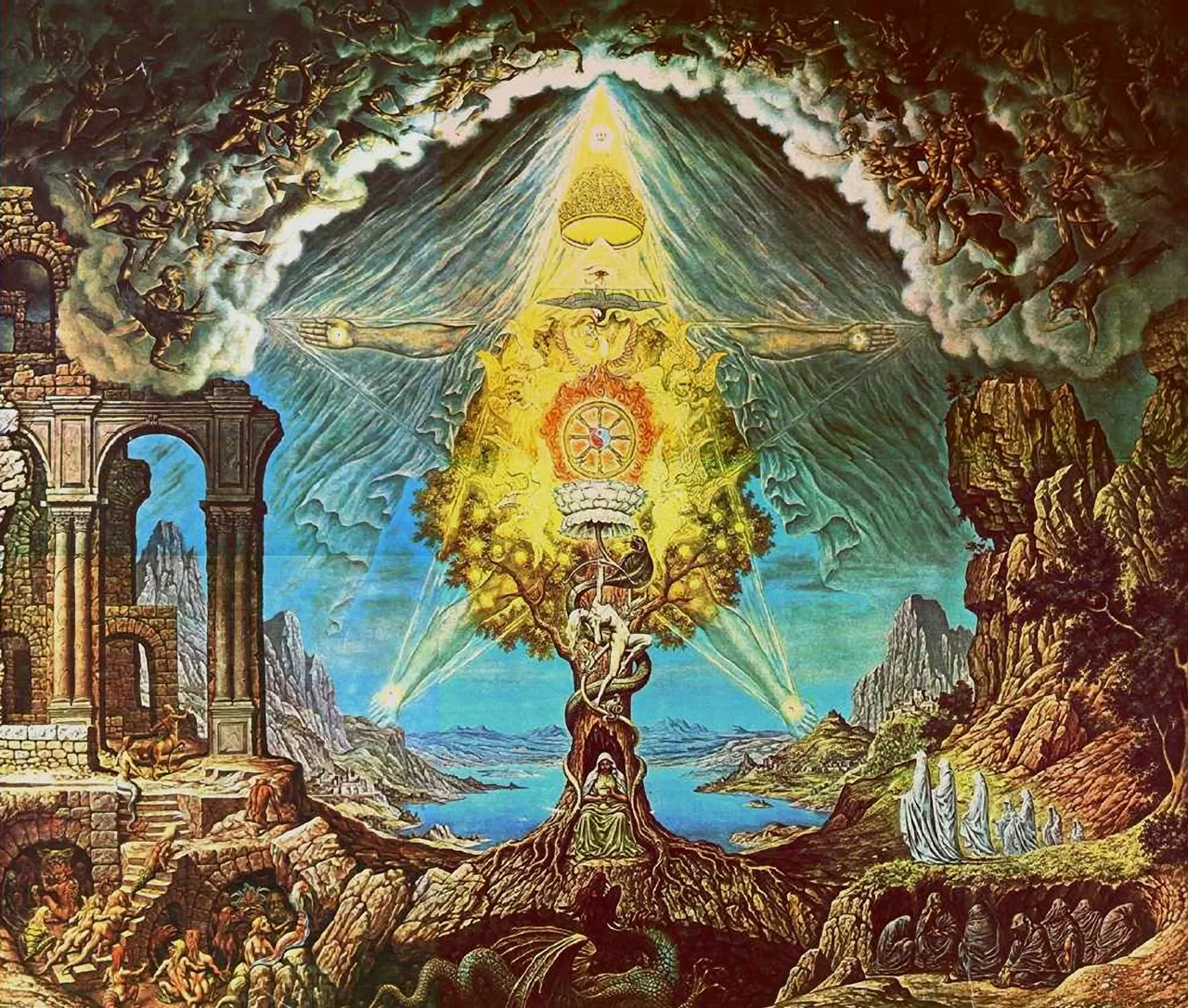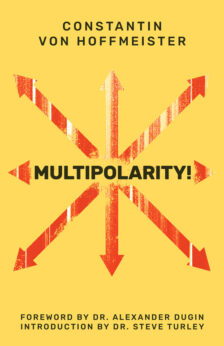Recently, I had a slight disagreement with one of the most interesting thinkers on YouTube, Keith Woods. It was an amicable chat about an article I wrote for the Arktos Journal a few years ago, titled Modern Statism as Western Gnosticism. In it, I brought together scholarship from numerous fields to synthesise the idea that modern liberalism is simply a recurrence or sect of age-old gnosticism.
As Keith notes, I am far from the first to observe this and I am in great company. I can understand why Keith is frustrated — top thinkers close to him, such as Prof. Edward Dutton, and others who have influenced his thought, such as Paul Gottfried, are largely in agreement with me. Of course, this is not to say that this theory is true because men smarter than Keith or me have concluded thus. Rather, I am surprised that, given Keith’s consistently excellent research, he would mischaracterise the opposing position with his video response title: ‘Is The Left a Gnostic Death Cult?’ I can’t think of any notable figure who has taken the step to saying that liberalism qua gnosticism is a death cult.1 Nevertheless, Keith makes some really interesting points in the video and so I will chalk the misleading title up to youthful post-ironic humour.
You will see this article is brief and that’s because Keith has two or three simple misunderstandings about the “liberalism is gnosticism” position. These are:
- that liberalism is materialism, has no metaphysical beliefs and therefore is not a religion;
- that gnosticism does not include or account for the mindlessly hedonistic masses of liberalism because gnosticism is supposed to hate the material world; and
- that liberalism, even progressivism, does not have a teleology per se, that is, a belief in some transcendent and objective end to man.
Let us address each of these points.
Are Today’s Liberals Faithless Materialists?
Certainly, moderns reduce almost everything to the material, they “immanentize the eschaton” (as Eric Voegelin famously put it) and they establish the “Reign of Quantity” (as René Guénon put it) etc., but this does not discount the metaphysical assumptions they make about their ego. Indeed, most are still comfortable to call this their soul or spirit. In truth, for the liberal, all is reduced to egoism, not necessarily materialism.
Simply consider the typical “woke” (a gnostic term if ever I heard one) liberal of today; they insist that they have their own truth — something can be true for them and the exact opposite can be true for another. If I declare that I am a banana and you are charitable enough to challenge me on the objective facts, and if you dare try to limit my most inner-will with data from the natural world and order, then you have apparently committed violence and are “literally Hitler”. The reason for this is they believe their ego is something separate from their physical body — they can be a woman or even an animal trapped in a man’s body. Contra scepticism, they believe that, in this ever-changing world of flux, their ego can posit truth. Indeed, such is the primacy of the liberal’s ego that they will use political force to uphold the subjective truth of their will over and in defiance of the physical constraints of the material world. They would be the voluntaristic god of their own universe.
To repeat, liberalism is spiritual egoism, not necessarily materialism.2
If liberals really believed that “we are our brains” then they would not strive for their immaterial ego to be deemed totally separable from the body. The whole idea of the Singularity and transhumanist dreams of the mind meaningfully existing separate from embodiment would be laughed to scorn. On the contrary, it is frequently popularised in sci-fi. In short, the gnostic liberals actually have transcendent, metaphysical beliefs about the ego, the “soul”, whether they will consistently acknowledge this or not.
What of Hedonistic Lovers of This World?
The brilliant Ken Wilber observed that philosophies and religions are either “ascenders”, pointing upward, toward the One, the Eternal, or they are “descenders”, pointing downward, toward the many, the temporal world of matter. Christianity fascinatingly does both, but I won’t digress. Keith queries where the hedonistic descenders fit into modern Western gnosticism.
As Keith notes, in certain ancient gnostic sects, there were three spiritual classes with the “hylics” at the bottom; these descenders were basically soulless animals who could only desire material things and never spiritual things. I could simply argue that maybe the liberal elites consider most of the masses as soulless cattle who only deserve to own nothing, live in pods, eat the bugs and plug into the pleasure box — they become tools to serve the elites’ ends, as does all of material nature. None of this precludes a gnostic framework.3
However, it isn’t even necessary to make that argument. Not all gnosticism is monkish asceticism. There were always schools of gnostic libertinism — those who indulged in sin and believed that this had no bearing on their egoistic soul. Either they believed that the spirit is willing, but the flesh is weak, or they even indulged, believing that the evil material world with its supposed moral laws was created by an evil emanation and not the true One or God of the Platonists and Christians; flouting the moral law could sometimes be encouraged. ‘Gnostic libertinism thus spans the whole scale from mere negative license to positive Faustian obligation.’4
Keith contends that public “intellectuals” like Yuval Noah Harari are not interested in the spiritual transcendence of the masses, but want us docile, drugged and distracted with bread and circuses whilst the elite keep the population figures down. But, this is ignoring the fact that the masses are “trusting the science”, putting their faith in these gnostic elites with their (might as well be secret) gnosis of scientific knowledge. Just look at how religiously trusting the masses of the world have been to the scientific advisers of their political classes, especially during the worldwide Covid lockdowns, believing they will deliver them from death. Gnosticism has always had its trusted elites to guide initiates in such revolts against the natural order.
The argument really boils down to this question: Aren’t gnostics supposed to hate the material world? Surely, they would not want eternal life in the material world, certainly not living in a computer. Gnostics should want eternal transcendence, not eternal immanence in the world. Aren’t they all just materialistic descenders?
But, are the elites necessarily encouraging the masses to be more attached to material things? Are we, the consumers, actually becoming more attached to material things and the natural world?

The Androgyny
As Prof. William T. Cavanaugh has observed in Being Consumed, we aren’t becoming more attached to material things, rather we could not care less what they’re made of or how disposable they are. Nor are we becoming more attached to the natural world; we love to be thought of as caring for the planet, but we urbanites know nothing of it — we know we would not last five minutes fending for ourselves. Material goods and the natural world are not as important to us as the flattery of our ego and the promise of escaping death. It’s not that we can’t leave the cities; we just don’t want to. We are increasingly seeking out virtual experiences rather than the real thing. This rebellion against nature, and the imagined triumph of one’s will over it is gnosticism. Trends, such as gender reassignment, are demonstrably ancient examples of it.
The Teleology of Transhumanism
The gnostic liberals do have a teleology, an end for human existence — it is the mastery of nature. Again, this belief is transcendent and makes metaphysical assumptions about the mind, destiny etc. whether the liberal realises they are engaging in metaphysics or not. Transhumanists believe that we can and will escape the shackles of this material body, and thus escape death, preserving our souls and transcending to create our own meta-worlds; not just augmenting this reality but subordinating the resources and tools of the material world to our own virtual worlds; not storming heaven but inventing our own as gods. In such worlds, we would no longer be subject to the pleasures and pains of this world but would command all things at will — a will freed from the constraints of the body and the natural world.
Now, I am of course not saying I believe this is good or even possible, but they believe it, and such a belief is unmistakeably a sect of gnosticism. Claiming that this is not real gnosticism because the gnostic’s self-made heaven is not the real heaven is more indicative of Keith’s beliefs than it is the egoistic gnostics’.
As the influential John Gray (who is an atheist) aptly observed in The Soul of the Marionette,
the Gnostic faith that knowledge can give humans a freedom no other creature can possess has become the predominant religion. … Believing that human beings can be fully understood in terms of scientific materialism, they reject any idea of free will. But they cannot give up hope of being masters of their destiny. So they have come to believe that science will somehow enable the human mind to escape the limitations that shape its natural condition.5
Conclusion
We have seen that:
- liberalism is not materialism, it is spiritual egoism as it makes metaphysical assumptions about the ego;
- liberals aren’t becoming increasingly attached but rather detached from the material world; and
- liberalism believes in the teleology of scientific progress to free the ego from the body in order to master the material world.
None of this addresses all of the arguments for modern liberalism being gnosticism in my original article, so I advise you to read that if you would like to learn more.
Regardless, I might be wrong about all of this. If Keith could overturn this conversation and convince us all of our error, I’d be grateful and very pleased for him. Instead, a much more significant conversation I think we should be having on the right is that of individualism vs corporatism — understanding how successful human groups grow and behave, and understanding how individualism can destabilise and kill the body politic. Too many on the right are still hung up on individualistic religious and political ideas to our detriment, and this urgently needs addressing.
If liberalism is gnostic, it is an egotistic, spiritually individualist sect of gnosticism and therein lies the problem.
References








It should be ‘immanentize’ not ‘immenantize’ the eschaton.
Thank you!
On your points:
-“Liberalism is not materialism, it is spiritual egoism”. Gnosticism is about achieving union with the supreme Godhead.
-“Liberals aren’t becoming increasingly attached but rather detached from the material world” Are they really? I would say the person absorbed all day in a fake digital world is just as much or more attached to the material world than an average factory worker.
-“Liberalism believes in the teleology of scientific progress to free the ego from the body in order to master the material world.” How on earth is that gnostic? A gnostic is evidently not at all interested in mastering the material world. It is all about radical transcendence. Also there is NO conception of “progress” in gnosticism. There is only awakening from the illusion of the material world. I would say that gnosticism is just as “atemporal” in its outlook as Buddhism for example.
I can see where you’re coming from, but the gnostics are your ally in your concerns about transhumanism. You might not like their worldview, which might be all about “Luciferic illumination”. but there it is. I am with Keith Woods on this one, most definitely.
1. Some sects of gnosticism accepted the divine within to the extent that enlightenment is to recognise one’s own godhood. This would certainly be the case for the sort of modern liberal Westerner I have in mind.
2. You might argue that digital worlds aren’t really detached from the material world, but that doesn’t mean others have to agree with you or even want to agree with you.
3. There is too much evidence of gnostics seeking to overcome the material world, I’m not even sure where to begin to respond to this. We must agree to disagree. Perhaps I have misunderstood your point.
As for you being an ally, my war is against spiritual individualism so please feel free to join my spiritual struggle if you wish.